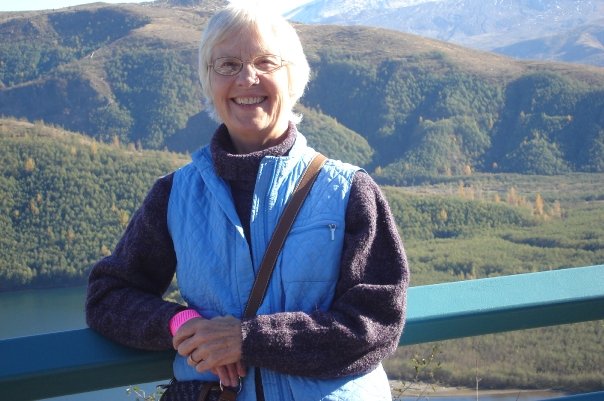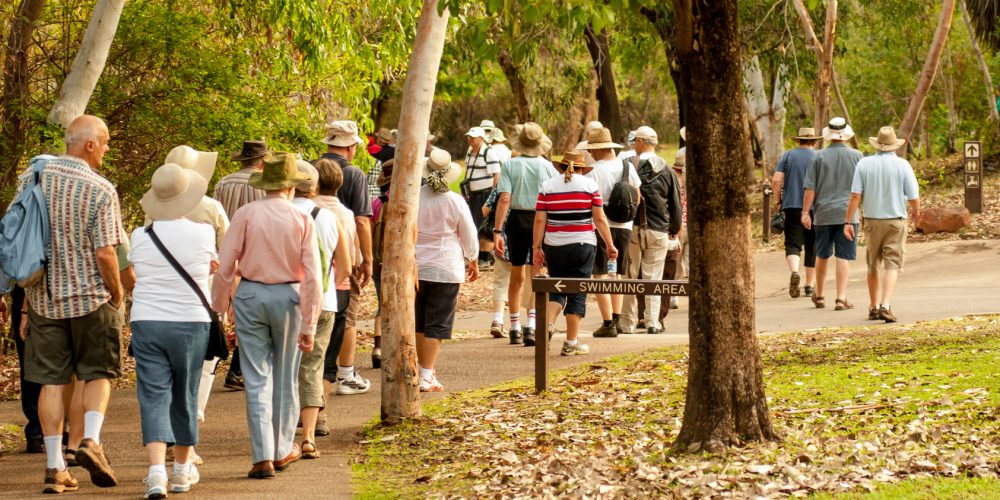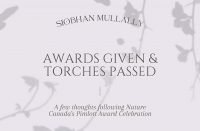Recently, a group of senior citizens calling themselves the “Walking Sticks” met at High Park Nature Centre in Toronto to participate in a unique Nature Elders program. Nature Elders is an environmental education experience designed to address the unique needs and interests of seniors.
Recently, a group of senior citizens calling themselves the “Walking Sticks” met at High Park Nature Centre in Toronto to participate in a unique Nature Elders program. Nature Elders is an environmental education experience designed to address the unique needs and interests of seniors. As the Walking Sticks and other seniors gathered for their Nature Elders session, the topic of conversation focused on past experiences with nature, times when – for many seniors – nature was a big part of everyday life. The Nature Elders program was developed, in part, to give seniors the opportunity to reminisce about such experiences. According to environmental psychologist Louise Chawla, recalling such experiences can deepen one’s connections with the natural world. Such memories, she says, continue to enrich our lives as we grow older; they’re like radioactive jewels buried within us emitting energy across the years of our lives.
The Nature Elders program – now under revision to accommodate differing levels of mobility and to include seniors in retirement residences – is just one example of an emerging trend to get more seniors engaged with nature. As described by Richard Louv in his book The Nature Principle, we all need nature for our physical, psychological and emotional well-being. Yet, opportunities for active engagement with nature are rapidly diminishing.
RELATED: “Prescribing a Dose of Nature” in A\J’s Ultimate Health Issue.
While nature centers and other environmental institutions offer programs to reconnect people with nature, their activities are often designed for younger people who hike, bike and kayak. Health, mobility and stamina issues may prevent seniors from being active participants in such programs – thus the emergence of specifically designed programs.
Some programs bring seniors to nature; others bring nature to seniors. The Fontenelle Forest Nature Center in Bellevue, Nebraska, does both. Their on-site program – referred to as SUN (Seniors Understanding Nature) – has been in place for 12 years and attracts 30 to 50 seniors each monthly session. A typical SUN session includes a stimulating nature-related program (an interactive presentation on native plants, for example), light refreshments and some social time – all with the special needs of seniors in mind. SUN sessions are usually followed by an optional guided walk through the forest or along the river. A boardwalk makes this accessible for participants with wheelchairs and walkers.
The Fontenelle Forest Nature Center also offers Traveling SUN, which takes the program to locations where seniors gather, including church groups, community groups, independent living facilities and assisted living and long-term care sites. Catherine Kuper, an educator at Fontenelle Forest, reports that Traveling SUN is actually more in demand than SUN. Last year, Traveling SUN presented 220 outreach programs to 4,000 seniors. Such a demand, along with ten years of history, attests to the success of this program in meeting seniors’ interest in the natural world and their desire to learn.
OWLS (Older and Wiser, Learning for Seniors) is another example. OWLS is offered through the Brillion Nature Center in Brillion, Wisconsin. Louie Kolberg, naturalist with the Brillion Nature Center, says that OWLS started after the activities coordinator of an assisted living center asked if her residents would be able to participate in “Smalls and Talls” – a program designed for young children (preschoolers) and their caregivers. Activities for preschool children who are highly mobile and have lots of energy are generally not a good fit for seniors, so Kolberg started the OWLS program, where activities accommodate a wide range of mobility, dexterity and cognitive abilities.
Kolberg says that one of the goals of OWLS is to give seniors an opportunity to get “out of the box” – both literally and figuratively. So many people, she notes, end up spending the majority of their golden years alone inside the same walls day in and day out. For Kolberg, it was important to give seniors a chance to have social interaction while learning something new in a beautiful setting. Through the OWLS program, seniors are getting out in the woods, sitting around a campfire, visiting a pond, seeing live animals and sharing memories that haven’t surfaced in years.
By the end of the program, participants dealing with depression reported greater feelings of happiness and joy and reduced feelings of sadness, hopelessness and loneliness.
Programs like these are based on the understanding that getting seniors outside in nature promotes their overall well-being. Research provides strong support for this understanding. Ruth McCaffrey, Professor of the College of Nursing at Florida Atlantic University, helped to establish the “Stroll for Well-Being” garden walk program at Morikami Park near Boca Raton, Florida. By the end of the program, participants dealing with depression reported greater feelings of happiness and joy and reduced feelings of sadness, hopelessness and loneliness. These findings are consistent with other studies reporting less depression and improved cognitive functioning for seniors who spend time actively engaged with nature, indicating that engagement with nature can improve seniors’ capacity for living independently over a longer period of time.
Another avenue for seniors to become engaged with nature is through the Road Scholar program (run by Elderhostel). Road Scholar Canada offers educational tours in all provinces. An online search can be done by province, monthly features or most popular programs. The most popular nature tours in Canada include “Rockies by Rail: Western Canada’s Splendor” and “Northwest Waterways.” Travellers can also search by area of interest, such as birding, walking/hiking, or natural history. Not all seniors have access to nature-focused programs in their communities or are interested in nature-related travel, but opportunities for connecting with nature are numerous. Something as simple as a garden bench or a path through a nearby park can be used to enhance closeness with nature. Studies from Japan suggest that walking through a forest may be especially effective in reducing stress, lowering blood pressure, strengthening the immune systems, and reducing symptoms related to depression and anxiety. These studies are based on the popular practice of shinrin-yoku, or “forest-bathing,” which is now a recognized relaxation and stress management activity in Japan.
In The Nature Principle, Louv explains how a daily dose of “Vitamin N” – nature, not something that comes in a bottle – is essential to our health and well-being. Seniors, like everyone else, can reap the benefits of this prescription – and have fun at the same time.

Ruth Wilson worked as a teacher and teacher educator for over 30 years, including with the Environmental Studies program at Bowling Green State University in Ohio. She currently devotes full time to consulting and writing about environmental education initiatives and issues. Wilson has several published books and over 60 articles. Her most recent book is Nature and Young Children (Routledge, 2012). Wilson’s articles have appeared in both academic and non-academic publications, including American Forests, Teachers & Writers, and Exchange magazine.













